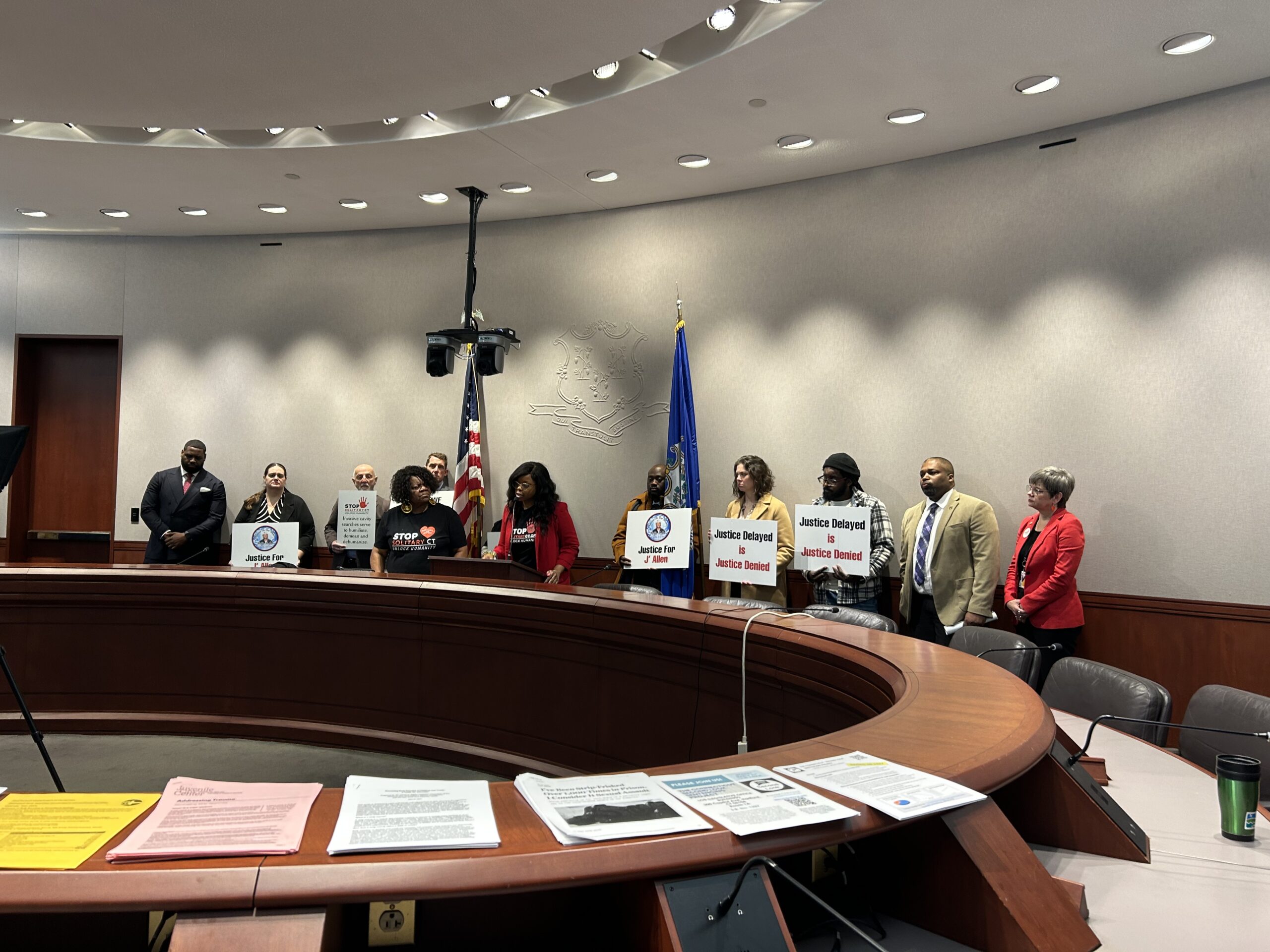Seven-year anniversary of prisoner homicide sparks calls for strip search policy reform
Legislators and criminal justice advocates condemned strip searches at a press conference honoring J’Allen Jones, who died at the hands of correctional officers on March 25, 2018, after refusing to comply with a search.

Maia Nehme, Contributing Photographer
HARTFORD — J’Allen Jones died after he was forcefully restrained by correctional officers for refusing to comply with a strip search on March 25, 2018. Exactly seven years later, criminal justice advocates, legislators and former correctional staff gathered at a press conference to honor Jones’s memory and push for strip search policy reform.
On the day he died, Jones — who was diagnosed with schizophrenia — was slated for a transfer to Garner Correctional Institution’s psychiatric ward for treatment. The state Department of Correction strip search policy states that these searches should be carried out each time an incarcerated person is placed in a specialized housing unit, including medical and mental health areas.
After Jones refused the strip search, multiple correctional officers pepper-sprayed him in the face, punched him and forced him onto a bed over a nearly half-hour period. The correctional officers and a nearby nurse did not administer CPR or call 9-1-1 for seven minutes after Jones fell unconscious.
The state Office of the Chief Medical Examiner classified Jones’ death as a homicide.
“J’Allen Jones would be alive today if he had just submitted to getting on his knees and pressing his chest against a bed so that the correctional officers can look up his rectum,” said Barbara Fair, who heads criminal justice reform organization Stop Solitary CT and organized Tuesday’s press conference. “What we’re doing is wrong. It’s sadistic, it’s disgusting and its purpose is to break people and dehumanize them.”
Fair has long supported the implementation of body scanning machines — x-ray machines that detect contraband on the body — in prisons. Body scanners would reduce the need for strip searches; a 2024 DOC report estimated that body scanners would have eliminated the need for 235,050 strip searches in 2023.
However, Fair flagged the high cost of body scanners, arguing that revising the DOC’s strip search policy so that searches happen less frequently is a quicker and cheaper solution.
Past attempts to revise strip search policy have been unsuccessful. In 2023, the state legislature introduced a bill that would raise the bar for performing strip searches from “reasonable suspicion” to “probable cause” that an individual is carrying contraband, but it was watered down into a law that required a DOC report on the cost of implementing body scanners.
Both state Rep. Anne Hughes and state Sen. Gary Winfield, who represents New Haven, attended Tuesday’s press conference and emphasized the psychological toll of strip searches. Hughes has introduced two bills aimed at regulating strip searches in the current legislative session.
“I’m urging all of my colleagues to vote for policy change once and for all,” Hughes said. “Mr. Jones should be our George Floyd moment in changing everything.”
At the press conference, two former DOC employees and a formerly incarcerated man shared stories about witnessing or experiencing strip searches.
Hassan Foster, a New Havener who knew Jones when they were incarcerated together at Garner in 2015 and 2016, described two strip searches he underwent in prison. In one of the instances, Foster said, a female correctional officer carried out a strip search on him and ignored his requests to be searched by a male staff member instead.
The DOC strip search policy states that correctional staff make “[r]easonable accommodations” to ensure same-gender strip searches, but if a same-gender correctional officer is not available and the strip search is considered “essential without delay,” then a cross-gender strip search will be conducted.
“This is the type of thing that goes on in there,” Foster said. “They don’t care about your rights. They don’t care about anything.”
Kevnesha Boyd, another speaker at the press conference, worked as a mental health counselor at New Haven Correctional Center for four years.
Each day, she had to collect incarcerated people from the admissions and processing room — where they were often being strip searched — to bring them to her office for a meeting about their mental health.
“When I hear the story of Mr. Jones,” Boyd said, “I can only hear the collective echoed voices of the many incarcerated people that I heard say, ‘I don’t want to do this.’ ‘Is there a different way that we can do this?’ ‘I don’t have anything.’ ‘I’ve been patted down.’”
Fair, Hughes and other speakers also noted that the video of Jones’s death at the hands of correctional officers has not been released to the public, despite almost seven years of litigation between the officers and Jones’s estate.
In October 2024, the American Civil Liberties Union of Connecticut filed a petition with the appellate court for the immediate release of the video of Jones’s death. The appellate court then ordered the Superior Court to hold a hearing to determine whether the video should be sealed or shared with the public.
At the hearing, which was held in late December 2024, the decision whether to release the video was postponed again. Dan Barrett, executive director of the ACLU of Connecticut, clarified on Tuesday that the Superior Court still has not made a decision about whether to release the video.
“We would like the public to be the judges [of] what actually happened,” Barrett said. “Not stories, not a government employee’s say-so, but facts — and this video is the prime, and perhaps even the sole, evidence of what happened to Mr. Jones.”
The next hearing in the Jones estate’s lawsuit is scheduled for Aug. 26.
Interested in getting more news about New Haven? Join our newsletter!







